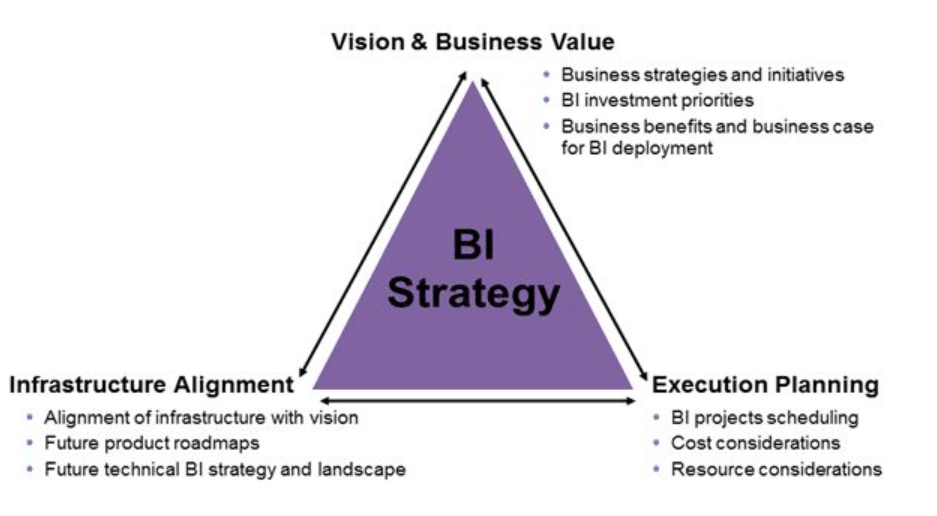Introduction
In today’s fast-paced business environment, staying ahead of the competition requires more than just intuition and experience. It demands a strategic approach to harnessing the vast amount of data available. Welcome to the world of Business Intelligence (BI), where data becomes a valuable asset in decision-making. Let’s delve into the strategies that can help businesses master the data game.

The Role of Data in Business Intelligence
At the heart of BI lies data – the raw material that powers insights and drives informed decisions. Businesses need to recognize the pivotal role data plays in gaining a competitive edge. It’s not just about collecting data; it’s about understanding its significance and leveraging it for strategic advantage.
Key Components of Business Intelligence
To effectively utilize data, businesses need a robust BI infrastructure. This includes efficient data collection, secure storage, advanced processing, and user-friendly reporting tools. Each component plays a crucial role in ensuring that data translates into actionable insights.
Choosing the Right Business Intelligence Tools
With a myriad of BI tools available, selecting the right one for your business can be overwhelming. From giants like Tableau to emerging players, understanding your specific needs and the features each tool offers is paramount. This section will guide you through the decision-making process.
Implementing Business Intelligence Strategies
Developing a BI strategy involves aligning organizational goals with data-driven initiatives. It’s not just a technological shift; it’s a cultural one. Learn how successful businesses seamlessly integrate BI into their daily operations and the benefits they reap.
Data Security in Business Intelligence
As the value of data increases, so does the need for robust security measures. This section explores the critical importance of safeguarding sensitive information in BI, along with strategies to ensure data confidentiality.
Challenges in Business Intelligence
While the benefits of BI are undeniable, challenges abound. Complex data structures and resistance to change are common hurdles. Unravel the complexities and discover effective ways to overcome challenges in BI implementation.
Real-world Examples of Successful BI Implementation
Nothing speaks louder than success stories. Delve into real-world examples of businesses that have transformed their operations through BI. Learn from their experiences and understand the key takeaways for your own BI journey.
The Future of Business Intelligence
BI is a dynamic field, constantly evolving to meet the demands of the future. From artificial intelligence integration to predictive analytics, explore the trends shaping the future of BI and how businesses can stay ahead of the curve.
Building a Data-Driven Culture
BI success goes beyond technology; it’s about instilling a data-driven mindset in your organization. Discover strategies to nurture a culture where data is not just a tool but an integral part of decision-making at every level.
Measuring the Success of BI Strategies
How do you know if your BI strategies are working? This section introduces key performance indicators (KPIs) to measure the success of your BI initiatives. Learn how to continually refine and improve your BI implementation for optimal results.
Common Myths About Business Intelligence
BI is not without its misconceptions. Explore and dispel common myths surrounding BI, ensuring that businesses have a clear understanding of what BI can truly offer and how it can transform their operations.
Benefits of Mastering the Data Game
The rewards of mastering the data game are immense. Increased efficiency, enhanced decision-making, and a competitive edge are just the beginning. Understand how businesses can benefit from a strategic approach to BI.
Adapting BI Strategies to Different Industries
BI is not one-size-fits-all. Tailoring BI strategies to the unique needs of different industries is crucial. Gain insights into how businesses in various sectors have successfully adapted BI approaches to drive success.
Conclusion
In conclusion, mastering the data game through effective BI strategies is no longer a luxury; it’s a necessity. Businesses that embrace and implement BI will find themselves better equipped to navigate the challenges of the modern business landscape.
Frequently Asked Questions (FAQs)
- Q: How can businesses ensure the security of sensitive data in a BI environment?
A: Implementing encryption protocols, user access controls, and regular security audits are key measures to ensure data security in BI. - Q: Are there any affordable BI tools suitable for small businesses?
A: Yes, several BI tools offer cost-effective solutions tailored for small businesses, such as Microsoft Power BI and Google Data Studio. - Q: Can BI be applied to non-profit organizations?
A: Absolutely. BI is versatile and can be adapted to the unique needs of non-profit organizations to enhance decision-making and operational efficiency. - Q: How quickly can a business expect to see results after implementing BI strategies?
A: The timeline varies, but businesses often start seeing positive impacts within a few months of implementing effective BI strategies. - Q: Is training necessary for employees to effectively use BI tools?
A: Yes, providing comprehensive training is crucial to ensure employees can make the most of BI tools and contribute to a data-driven culture.